- 6 Hot And In-Demand Tech Areas In 2024
- How To Forward Your Career With Cloud Skills?
- Top 7 On-Demand IT Certifications
- Most In-demand Technologies To Upskill Your Career
- Top 10 Hottest Tech Skills to Master in 2024
- Top Skills You Need to Become a Data Scientist
- Groovy Interview Questions
- Facets Interview Questions
- Crystal Reports Tutorial
- VAPT Interview Questions
- Flutter Tutorial
- Saviynt VS Sailpoint
- Flutter vs Xamarin
- PingFederate Interview Questions and Answers
- Dart vs Javascript : What's the Difference?
- Terraform Private Registry
- Cylance Interview Questions and Answers
- Sophos Interview Questions and Answers
- Top Camunda Interview Questions
- NUnit Interview Questions and Answers
- Impala Interview Questions and Answers
- ETL Tutorial
- Ionic Interview Questions
- Grafana Tutorial
- What is VAPT? - A Complete Beginners Tutorial
- SnapLogic Interview Questions
- Saviynt Interview Questions
- What is PingFederate? - A Complete Beginners Tutorial
- SnapLogic Tutorial
- Grafana Interview Questions
- RHCE Interview Questions and Answers
- Web Services Interview Questions
- Domo Interview Questions and Answers
- Terraform Interview Questions
- What is Sophos? | Sophos Turorial for Beginners
- Top Servlet Interview Question And Answers
- NLP Interview Questions and Answers
- Microsoft Intune Interview Questions
- Top XML Interview Questions And Answers
- Tosca Commander
- Katalon vs Cypress
- SQLite Tutorial
- Tosca Tutorial - A Complete Guide for Beginners
- Xamarin Interview Questions and Answers
- UiPath vs Automation Anywhere - The Key Differences
- OpenShift Interview Questions
- What is Katalon Studio - Complete Tutorial Guide
- Kronos Interview Questions
- Tosca Framework
- Burp Suite Tutorial
- Mendix Interview Questions
- Power Platform Interview Questions
- Burp Suite Interview Questions
- What is Mendix
- What is Terraform ?
- Burp Suite Alternatives
- What is Kronos?
- ES6 Interview Questions
- Entity Framework Interview Questions
- COBOL Interview Questions
- Express JS Interview Questions
- OSPF Interview Questions
- LINQ Tutorial
- CSS3 Interview Questions and Answers
- Auth0 Tutorial
- MS Access Interview Questions
- What is SPARQL - A Complete Tutorial Guide
- ExpressJS Tutorial
- UML Tutorial
- HTML vs XML
- Cypress vs Jest
- Impacts of Social Media
- OWASP Interview Questions
- Security Testing Interview Questions
- OpenShift vs Docker
- ES6 Tutorial
- Spark SQL Interview Questions
- Spark SQL Tutorial
- What is OWASP?
- AppDynamics Interview Questions
- Dynatrace Interview Questions
- Rest Assured Tutorial
- New Relic Interview Questions
- REST API Tutorial
- Datadog Interview Questions
- Rest API Interview Questions
- Rest Assured Interview Questions
- PTC Windchill Interview Questions
- Easiest Tech Skills To Learn
- Python SQLite Tutorial - How to Install SQLite
- Datadog Tutorial - Datadog Incident Management
- What is AppDynamics - AppDynamics Architecture
- RabbitMQ Interview Questions And Answers
- What is Dynatrace
- Datadog Vs Splunk
- Web Developer Job Description
- JP Morgan Interview Questions
- Types of Corporate Training
- Benefits of Corporate Training
- What is Corporate Restructuring?
- Blended Learning in Corporate Training
- What is Corporate Level Strategy?
- Flutter Projects and Use Cases
- How to Become a Web Developer
- How To Install Keras?
- How to Install Flutter on Windows?
- How to Install Cypress on Windows?
- How to Become a Computer Scientist?
- How to Install Katalon Studio in Windows
- How to Become a Programmer
- OWASP Projects and Use Cases
- How to Install Sophos?
- Workato Tutorial
- Workato Tutorial - What is Workato?
For developing any kind of application, we use programming languages. Among various programming languages, Dart and Kotlin are gaining massive popularity over the recent years. Dart is a programming language used by Flutter to create beautiful, rapid, and compiled applications for desktop, web, and mobile. Kotlin is an object-oriented, open-source, and general-purpose programming language.
Due to variations in their features and working approaches, we can use Dart and Kotlin for developing different kinds of applications. In this Dart vs Kotlin blog, we will compare Dart and Kotlin based on different parameters.
Dart Vs Kotlin Table of Content:
What is Dart?
Google created Dart to help developers create better client apps and make the development process more manageable. It has maintained its reputation as a technology since then. Numerous visionaries have been able to present the world with apps that provide a unique experience. In the second half of this article, we'll discuss Dart-based apps.
Features of Dart:
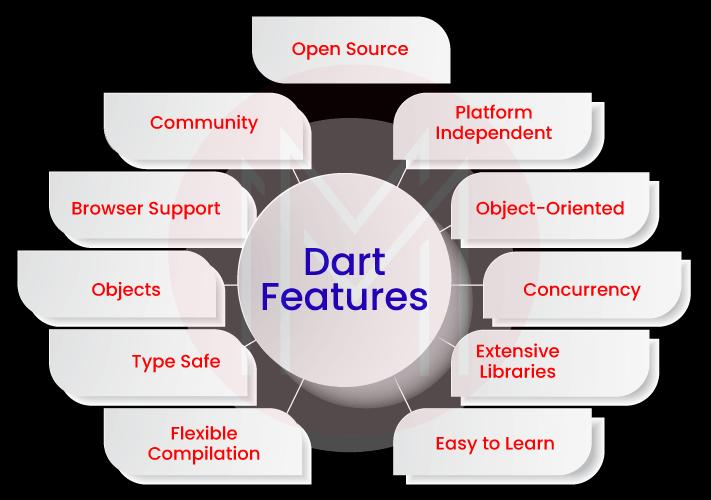
| Do you want to get certified and build your career in Dart programming? Then enrolling in our "Dart Online Training" course will help you to achieve excellence in this domain. |
What is Kotlin?
JetBrains, one of the most well-known IT companies, created Kotlin. It was created in response to their need for a less complicated language than Java. Kotlin has climbed to become one of the world's most popular languages. Google declared it the recommended language for Android app developers in 2019.
Features of Kotlin:
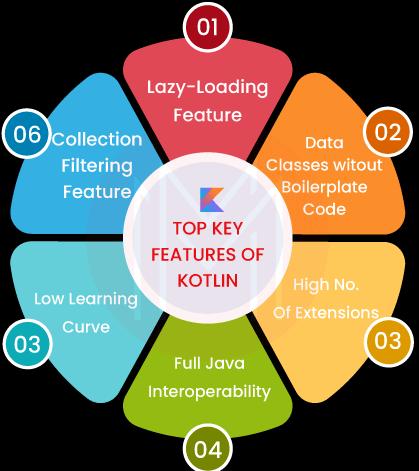
Commercial Comparison between Dart and Kotlin
-
Popularity
Popularity indicates the level of enthusiasm amongst customers and developers, and it can be used as one of the factors in deciding which programming language to use. Because of its popularity among developers, it will be cheaper to recruit developers, and because of the interest from clients, it will appeal to businesses.
Dart is tagged in over 1.2% of questions on Stackoverflow, while Kotlin is labelled in over 1% of queries that month. Nonetheless, there has been a growing interest in both languages. A Stackoverflow Trend Chart can be found here: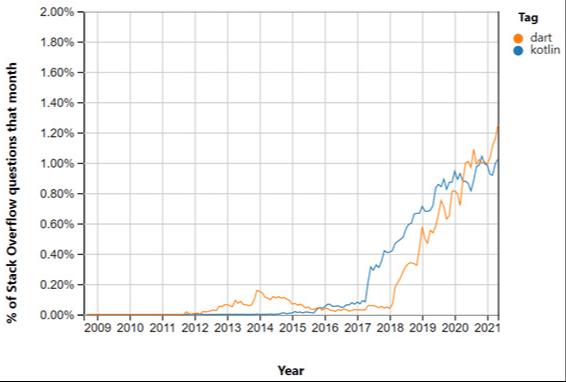
According to the Google Trends graph below, Google users were more interested in Dart than Kotlin over the last year: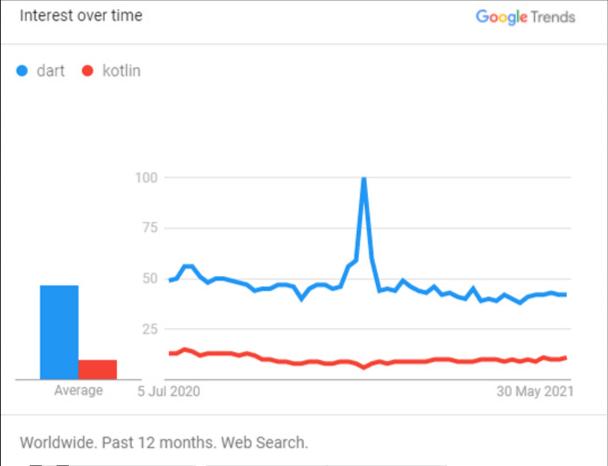
What do Dart and Kotlin developers think? Kotlin is utilised by 7.8 percent of respondents in the Stack Overflow Developer Survey 2020, while Dart is used by 4%. Both languages, however, are among the most popular, with Kotlin coming in fourth (62.9%) and Dart coming in seventh (62.1%), respectively. -
Market Share
When it comes to market share analysis, it's more customary to compare Flutter with Kotlin because Dart is used with the Flutter framework. The market share statistics for the two technologies are compared below:
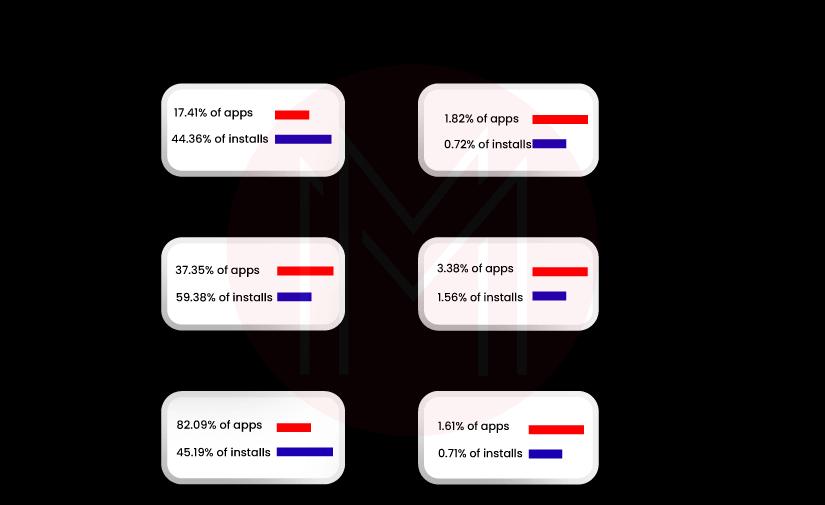
-
Learning Curve
The training is critical for developers when determining whether or not to begin learning a programming language, and it's also critical for customers while assembling team members: the simpler the language is to understand, the simpler it is to recruit the necessary expertise. Because of Google's extensive documentation, Kotlin is simple to learn, although the current focus is on Kotlin Multiplatform, which has fewer resources than Flutter and Dart. Still, it's only time with Kotlin's introduction of multiplatform support over a year ago.
-
App Development Costs
Because Dart and Kotlin are both open-source, you can gain unrestricted access to the source code and the documentation you'll need to get started. They also provide a quick way to construct an MVP because both Android and iOS apps can be created and maintained from a single codebase, reducing expenses by eliminating the need to operate two different source codes and hiring developers to build two versions for two different operating systems. Previously, Kotlin was only accessible for developing Android apps; however, with the launch of the Kotlin Multiplatform Mobile platform, it now supports cross-platform mobile development.
-
Pricing
The significance of pricing is crucial. In addition to developers, businesses and individuals are looking for technology comparisons to construct their business apps. Flutter apps are popular, and as a result, there are a lot of rivalries. As a result, clients can afford them thanks to the low price. With a Dart, you can build a multi-platform app for under 20,000$ for simple apps, 30,000$ for medium apps, and 45,000$ for large futuristic advanced tiered apps.
The Kotlin language, on the other hand, maybe used to create both native and cross-platform programs (Kotlin Native) (Kotlin Multiplatform). The basic price for native will be 35000$ (simple) to 80000$ (advanced), while cross-platform will be 25000$ (simple) to 55000$ (advanced) (advance). -
Cross-platform Support
Flutter and Dart have already made a name for themselves in the cross-platform world and love their outstanding performance and native support.
"Support for multiplatform development is one of Kotlin's primary strengths," according to the project's authors. It saves time by decreasing the effort involved in developing and updating the same code across platforms while maintaining flexibility and advantages of native programming."
When it comes to cross-platform programming, speed is crucial. Flutter's performance is excellent because of the Hot Reload feature, which allows you to alter the code and see the results right away. Still, Kotlin's performance is excellent because of the code's architecture and testability.
There is no definitive answer to which programming language to choose for cross-platform app dev.
On the other hand, Flutter appears to be an excellent low-cost language for entrepreneurs, allowing them to construct many apps with a single codebase. If you have any Java code that can be translated to Dart, Kotlin is the best choice.
Are Dart and Kotlin Similar or Different?
When comparing several technical qualities, they are pretty similar, yet there are some discrepancies. So, how do they compare? Here are a few instances that show what we mean:
- When comparing the syntax of Kotlin and Dart, they are more comparable to some extent.
- When it comes to composing comments and dealing with white spaces, both languages follow the same rules.
- Object-Oriented Programming Languages (OOP) include Dart and Kotlin.
- Dart and Kotlin are both statically typed programming languages, which implies that their set of rules assures that all pieces work together consistently. Dart is still using Kotlin's null safety in BETA.
Kotlin-Based Apps:
- Quizlet
- Google
- Pinterest
- Trello
- Netflix
- Airbnb
- Zomato
| If you would like to Enrich your career with a Kotlin Certified Professional, then visit Mindmajix - A Global online training platform: the “Kotlin Online Training” Course which helps you to achieve excellence in this domain. |
Dart-Based Apps:
- Google Ads
- Google Assistant
- Xianyu app
- eBay Motors
- Tencent
- SpaceX Go
- Dream11
Conclusion
You should be able to understand the difference between Dart and Kotlin by now. They both have immense benefits, but they also have considerable drawbacks. However, it is always critical to consider both technical and commercial aspects before you choose.
 On-Job Support Service
On-Job Support Service
Online Work Support for your on-job roles.

Our work-support plans provide precise options as per your project tasks. Whether you are a newbie or an experienced professional seeking assistance in completing project tasks, we are here with the following plans to meet your custom needs:
- Pay Per Hour
- Pay Per Week
- Monthly
| Name | Dates | |
|---|---|---|
| Dart Training | Feb 21 to Mar 08 | View Details |
| Dart Training | Feb 24 to Mar 11 | View Details |
| Dart Training | Feb 28 to Mar 15 | View Details |
| Dart Training | Mar 03 to Mar 18 | View Details |

















